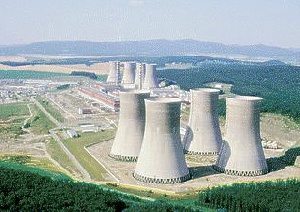Ever since the energy crisis of last year, discussions about nuclear power generation have reached fever pitch. In the last few days a Committee set up by the President has reported. According to news reports the committee thinks that Ghana can have nuclear power within 10 years.
As expected, public reaction to this report has been either positive or negative or indifferent. Some are also just playing plain politics with an otherwise serious issue. Reading through some of the comments on ‘Ghanaweb’, some think generating power this way counts Ghana among the ‘big’ nations of the world. Maybe it is being confused with nuclear bomb. As one contributor wrote; they are different and I will not dwell further on this. The same contributor, however, wrote that the general public can visit nuclear power stations. This is not true. Maybe this is informed by the Sellafield Visitors Centre in Cumbria, where models of the facilities are shown to visitors. The conditions for operating a licensed nuclear site include making the site highly secure. Consequently these plants are staffed by personnel who have been vetted and passed national security checks.
I have no leaning either way on the nuclear power debate but I want to draw the attention of Ghanaians to some of the issues involved which may not make the nuclear power generation the ‘Trojan Horse’ some are touting. These issues include siting, capital cost, safety and maintenance. The rest are international obligations, waste handling and storage as well as decommissioning.
Siting
One of the crucial factors in building a nuclear power station is finding a suitable site with favourable geology. Ideally a flat site with shallow rock head is required. The underlying rock should be un-weathered and should contain no faults and hence less susceptible to seismic shifts. This would require extensive geological and ground investigations to be carried out. Due to the potential hazards, nuclear power stations are sited away from population centres to protect the general public from accidental release of activity. This also facilitates the ability to isolate and protect the plant against malicious attacks.
Another determinant of siting is abundance of water supply for cooling purposes. I do not know how much public discussion there would be in the case of Ghana but where the public is adequately informed, there would be resistance among communities that live close to proposed sites. This would have to be factored in by the Government unless they plan to be undemocratic.
Design requirements and high capital cost Some contributors to Ghanaweb were quick to point out the economies of nuclear power generation. They certainly did not take into account the high capital cost; the cost of ensuring safety and security as well as the cost of carrying out maintenance, storing and managing waste; and lastly the cost of decommissioning.
To establish the design requirements, the whole process from handling and transportation of raw materials to power generation and management and handling of waste is operationalised. ‘What if’ scenarios are then pursued to identify what could go wrong and what has to be engineered to eliminate, reduce or manage the identified hazards (both conventional and radiological). This exercise results in what is called an Engineering Schedule in which are listed engineered Structures, Systems and Components (SSCs) that are required to deliver safety functions. Depending on the class of the safety function (which is defined in terms of consequences if there is failure) some of these SSCs have secondary and tertiary back-up systems. The successful delivery of the safety functions through the engineering of the SSCs results in the safe operation of the plant.
The building structures, plant support systems, plant and equipment as well as instrumentation can all be designated as SSCs depending on their functions in the plant process.
To be able to deliver the safety functions, the structures, for instance, have to be designed against normal, abnormal, fault and extreme environmental loads. In a similar vein, equipment and instrumentation have to be designed to high specification and have to be extremely reliable. Cranes, for instance, have to be high-integrity cranes that trip on being overloaded.
This gives a simplistic insight into what goes into the design without even talking about the reactor itself. This is just to illustrate the fact that the capital cost of a nuclear power station can be very high because of the high consequences of failure. It is therefore too simplistic to say that nuclear power is cheap. The power generation may be cheap but high capital cost could make the unit cost of electricity as expensive as obtained from other sources of energy.
Safety
The operation of nuclear sites is one area where lip service cannot be paid to safety. In this case, operations would have to be safe for the consequences of failure are potentially catastrophic. Safety is required in all aspects from transportation of active materials from ports to the power station to the operation of the plant itself and the storage of waste. There are international obligations and standards to meet since the consequences of a safety incident may not be restricted to one country only but also to neighbouring countries. Governments of neighbouring countries would therefore be stakeholders in our decision making.
Safety would call for the establishment of rigid rules of operation which are translated into safe working practices. There have to be the establishment of independent monitoring bodies to monitor safety and vested with the powers to prosecute corporate bodies and individuals for negligence. We have to ask the question whether we have such statutory bodies in Ghana who investigate industrial accidents with the powers to bring people to book.
Safety is not restricted to operations only but also to the handling of the waste generated. Everything that comes into contact with an active source, including items of clothing worn by operators, is contaminated and becomes nuclear waste. The contamination is not only through touch but can also be airborne such as dust.
There would have to be rigid procedures for classifying waste into lowly active, intermediate and highly active. The procedures for handling and dealing with these waste streams require a discipline that we have never known before in Ghana.
Security
In the current world climate of pre-emptive invasions and the backlash of terrorism, security of nuclear materials and plants is paramount. Due to this threat, there would be a huge international interest in how Ghana handle radioactive materials and ensure the security of the facility itself against malicious attacks.
We would have to account for all radioactive materials to international organisations, especially the IAEA. We would have to safeguard both the raw materials and the spent fuel. If any of these fall into the wrong hands, they can be made into ‘dirty bombs’. These are not conventional nuclear bombs. Rather radioactive material is packed into crude explosive devices to spread radiation, which can be inhaled by the public. You can bet that because of this the US and other Western nations would take keen interest in what goes on in the Ghanaian nuclear industry. They would be using proxy agencies such as the IAEA to bring untold pressure to bear on us and every incident, irrespective of its significance, would be in the international domain.
Ensuring security of the facility may require ‘no-fly’ zones to be declared around the plant. We would be required to police these ‘no-fly’ zones with military fighter planes on constant standby to escort or chase intruders out of the zones. All these are not cheap and would add to the cost of building and operating a nuclear power station.
Finally, as part of the safety culture that we would have to develop, periodically we would have to go over the safety functions of the plant and assess whether or not the existing SSCs have and would continue to deliver the safety functions. This would require plant operators to input their experience from operating the plant.
Maintenance
One of the issues most commented on in the pages of ‘Ghanaweb’ is the lack of maintenance culture in Ghana. We would not have that leisure with a nuclear power plant.
We would have to identify the life limiting features of all structures, systems and components delivering safety functions. A maintenance regime would then have to be set up whereby the condition of the SSCs is inspected regularly and recommendations made with regards to repairs and replacements and timescales within which they are to be implemented. Such recommendations cannot be shelved but will have to be acted upon lest someone is found to be negligent. Waste Storage and Decommissioning
Operating a nuclear power station does not only involve the design, construction, operation and maintenance. There is also storage of the generated waste and eventually decommissioning.
First the spent fuel has to be stored in cooling ponds for the fuel to cool down. This is followed by semi-permanent storage in fortified and secure stores for the activity to decay. This can take a very long time and repositories are required for long term storage.
The UK is still grappling with legacy waste dating back to the 1950s. The expectation was that after cooling and dismantling of the spent fuel, they could be stored in underground repositories. This was rejected at a public inquiry where the environmental lobby successfully argued that there could be leakage that could affect ground water sources.
Currently nuclear waste is being stored in purpose-built above ground stores, after reprocessing into nuclear fuel for recycling and less harmful by-products. This is costing a fortune to monitor, guard and secure. Meanwhile the volume of waste is growing and more storage space would have to be found to deal with future waste if the rumours to build new generation nuclear power stations in the UK prove to be true.
Conclusion
In conclusion I say that yes there are advantages with generating power through nuclear energy but there are considerable challenges to overcome in the case of Ghana. The implications are far reaching and will affect generations to come. Until we have considered all issues from design, construction, operation, security, waste management and eventual decommissioning, we should not be rushing to adopt nuclear energy. Irrespective of the Committees’ recommendations, we shall not see nuclear power in Ghana until we adequately demonstrate that we can discharge and meet the attendant international obligations and standards. To meet these would require a drastic shift in our attitudes. My observation is that we Ghanaians are pretty laid back and are always looking to cut corners. These would not serve us well if we are to pursue nuclear energy.
In the meantime, I will humbly suggest that we pursue parallel tracks with other sources of energy generation whilst we grapple with the feasibility of nuclear energy generation in Ghana and the obligations it entails. I do not doubt that we have the expertise but we need attitudinal change as well and this would have to be monumental.
















